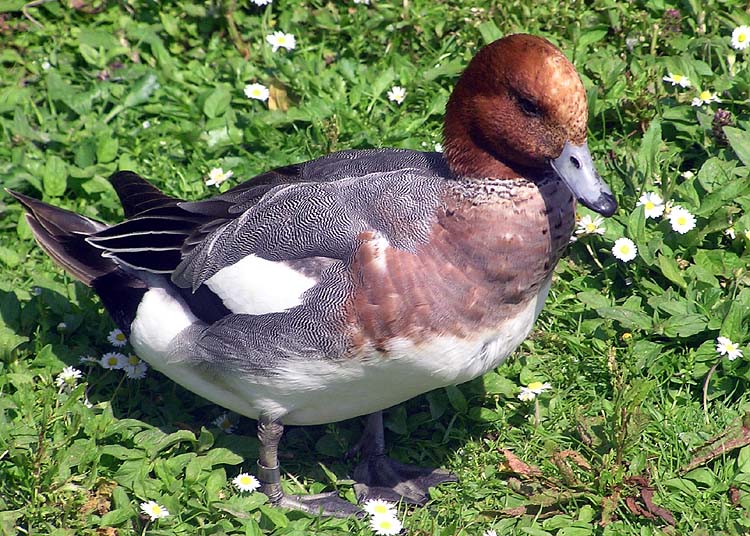|
| Query: Dabbling duck | Result: 17th of 100 | |
Eurasian Wigeon (Anas penelope) - Wiki
| Subject: | Eurasian Wigeon (Anas penelope) - Wiki
| |

| Resolution: 750x536
File Size: 158872 Bytes
Date: 2004:06:07 15:03:29
Camera: C750UZ (OLYMPUS CORPORATION)
F number: f/3.2
Exposure: 10/5000 sec
Focal Length: 414/10
Upload Date: 2008:01:04 13:54:13
|
Eurasian Wigeon
From Wikipedia, the free encyclopedia
Order: Anseriformes
Family: Anatidae
[Photo] Male Eurasian Wigeon (Anas penelope) at Slimbridge Wildfowl and Wetlands Centre, Slimbridge, Gloucestershire, England. Taken by Adrian Pingstone (http://commons.wikimedia.org/wiki/User:Arpingstone) in June 2004 and released to the public domain.
The Wigeon or Eurasian Wigeon (Anas penelope, previously Mareca penelope) is one of three species of wigeon in the dabbling duck genus Anas. It is common and widespread within its range.
Description
This dabbling duck is 42-50 cm long with a 71-80 cm wingspan. The breeding male has grey flanks and back, with a black rear end and a brilliant white speculum, obvious in flight or at rest. It has a pink breast, white belly, and a chestnut head with a yellowish crown stripe. In non-breeding (eclipse) plumage, the drake looks more like the female.The female is light brown, with plumage much like a female Mallard. It can be distinguished from most other ducks, apart from American Wigeon, on shape. However, that species has a paler head and white axillaries on its underwing.
Distribution
It breeds in the northernmost areas of Europe and Asia. It is the Old World counterpart of North America's American Wigeon. It is strongly migratory and winters further south than its breeding range. In Great Britain and Ireland the Wigeon is common as a winter visitor, but scarce as a breeding bird in Scotland, the Lake District, the Pennines and occasionally further south. It can be found as an uncommon winter visitor in the United States, particularly on both the Atlantic and Pacific coasts.
Behaviour and Habitat
The Wigeon is a bird of open wetlands, such as wet grassland or marshes with some taller vegetation, and usually feeds by dabbling for plant food or grazing, which it does very readily. It nests on the ground, near water and under cover. It is highly gregarious outside of the breeding season and will form large flocks.
This is a noisy species. The male has a clear whistle, whereas the female has a low growl.
The Wigeon is one of the species to which the Agreement on the Conservation of African-Eurasian Migratory Waterbirds (AEWA) applies.
http://en.wikipedia.org/wiki/Eurasian_Wigeon
| The text in this page is based on the copyrighted Wikipedia article shown in above URL. It is used under the GNU Free Documentation License. You may redistribute it, verbatim or modified, providing that you comply with the terms of the GFDL. |
|
^o^
Animal Pictures Archive for smart phones
^o^
|
|

